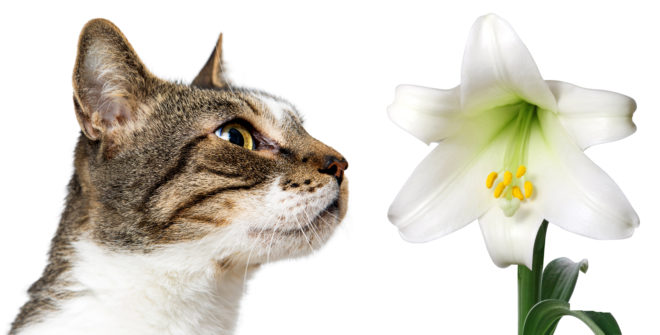One of the most unusual gardens I have ever seen was at the Cornell University Veterinary College in Ithaca, New York, where I studied many years ago. The garden was composed of poisonous plants, but only those known to be toxic to sheep, goats, cows, and horses – much less was known about plants dangerous to dogs and cats in those days. It was a requirement for our licensing exam as veterinarians to be able to identify these plants, know the toxins contained in the various parts of the plants (flowers, stems, leaves and roots), recognize the symptoms they can cause in our patients and know how to provide the appropriate therapy for each.
My memories of treating these farm animals were so long ago that they are thoroughly mixed with the descriptions of similar cases in James Herriot’s books, but modern medicine has come a long way. Pets and their ailments are now recognized as being at least as important, and we know much more about the dangers of plant poisoning in cats and dogs. (By the way, if you haven’t read Herriot’s All Creatures Great and Small books or watched the current TV version, you are missing out on some great stories and a delightful cultural event.)
For the great majority of plant poisonings in any species, from horses to cats, prevention is the name of the game. There are no specific antidotes for most plant poisons. If your pet eats a toxic plant in sufficient quantities to poison it, supportive care and treatment can be lifesaving, but there is no quick fix such as giving it a simple antidote to reverse the effects. The best solution is to simply keep your pet from gaining access to these plants and flowers!
Christina Wilkinson, our editor, has asked me to write about plants and flowers that are poisonous to cats and often associated with the holidays of Mother’s Day and Easter. Fortunately, roses, the most common flowers given for Mother’s Day (and Valentine’s Day), are not toxic to cats. Thank goodness!! (Do watch out for the occasional thorn, though.)
However, for plants commonly given as gifts for Easter, the news is mixed. Tulips, hyacinths, and daffodils are only mildly toxic, but can cause drooling, vomiting and diarrhea. Unless the cat has eaten a very large quantity of the plant, treating the symptoms is usually sufficient to restore your cat back to health.
Much more dangerous are lilies, which are highly toxic to cats. All parts of the plant, including the pollen alone, are poisonous. Cats that eat sufficient quantities of the plant develop acute kidney failure. Treatment within 24 hours of ingestion is ideal; if treatment is not prompt, death or chronic renal failure may result. If you are given a bouquet containing lilies (even just a few flowers in a mixed bouquet) don’t bring it into your house! Cats seem to be attracted to the aroma of these flowers, and no matter where you place them, cats manage to gain access to them. To repeat myself, prevention is the name of the game! PLEASE JUST AVOID LILIES!!
A very useful telephone number to have posted in your home is the
ASPCA Animal Poison Control Center hotline:
1-888-426-4435
There is a $50 fee for each call, but it is well worth it,
if it will save the life of your cat.



